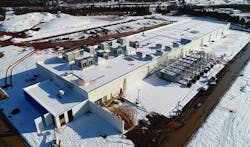QTS Partners to Fund Hyperscale Data Centers, in Manassas and Beyond
MANASSAS, Va. – In a significant step forward for its hyperscale computing ambitions, QTS Data Centers has formed a joint venture with global infrastructure investor Alinda Capital Partners that could provide up to $1 billion in funding for future data center construction.
The initial focus of the partnership will be the QTS campus in Manassas, where the company has just delivered the first phase of a new data center for a leading cloud service provider. The 188,000 square foot facility will be the first asset in the joint venture, in which QTS and Alinda will each own 50 percent. These joint ventures with investors are becoming an important tool for data center companies to fund growth, and provide a vehicle for investors to gain a foothold in the data center industry as it emerges as an important new asset class.
The deal reinforces the growing importance of infrastructure investors in providing capital to support the rapid growth of cloud computing. It also signals progress for QTS in executing its hyperscale strategy, as the Manassas project illustrating several key facets of the company’s plan to win business from large cloud platforms and social networks.
“This strategic partnership gives QTS a unique ability to optimize capital and expands our available sources of capital funding with an experienced infrastructure investor,” said Chad Williams, Chairman and CEO of QTS Data Centers.
A Customer-Driven Project
The Alinda investment provides $53 million in capital to support development in Manassas, an emerging data center hub in Northern Virginia, the world’s largest market for cloud computing. Manassas is about 20 miles south of “Data Center Alley” in Ashburn, where land costs are rising as prime properties get bought up in land banking by major data center developers.
The QTS Manassas project illustrates several elements of the company’s hyperscale program, including larger multi-building campuses, a flexible approach to leasing, the ability to work with tenants across multiple geographies, and the use of joint ventures to finance construction.
The Manassas site was abuzz with activity on a snowy afternoon in January, when the QTS team provided Data Center Frontier with an overview of the property and the company’s vision for its campus. QTS describes the Manassas campus as a “customer-driven project.” In early talks, the tenant discussed options to add capacity at QTS development properties in Phoenix and Hillsboro, Oregon. The requirement eventually shifted to Northern Virginia, where QTS acquired a 61-acre parcel in Manassas
A deal was negotiated using hybrid lease structure that allows the customer to reserve an entire building, that are pre-wired with power and fiber, and then gradually build out finished data center space. The customer leased the full 24 megawatt powered shell, and will pay QTS to build turn-key space within the shell in phased increments, scaling to the full 24 megawatts of power capacity over two years.
The first 5-megawatt phase was delivered earlier this month, and the second 4-megawatt phase is expected to commence in the second quarter of 2019.
QTS sees this initial customer deployment as the first building block for a larger hyperscale campus. The company has acquired an additional 102 acres in Manassas, which it says will enable “significant incremental growth capacity in excess of 100MWs.” QTS envisions building up to five data centers on its property, with the ability to deploy a single-story or two-story design, based on customer needs.
Building data center campuses at Internet scale is expensive. Meanwhile, the rapid growth of cloud computing has attracted new types of investors in the data center industry, who are eager to capitalize on the sector’s success. That creates an opportunity for QTS and other developers, who are actively seeking to develop joint ventures to spread risk.
A Long-Term, Programmatic Partner
Infrastructure funds traditionally have invested in projects like airports and toll roads, and have longer timelines for return on investment than private equity funds, which have been the prime movers in data center investing. Alinda is a major investor in London’s Heathrow Airport, as well as the Virginia International Gateway port project and energy resources along the U.S. Gulf Coast.
Alinda will pay $53 million to QTS at closing to acquire its 50 percent interest in the Manassas project, which will grow to approximately $87 million as the first building “stabilizes” with subsequent tenant leasing. QTS says the arrangement will reduce its capital funding requirement by $120 million over the development of the Manassas facility, while retaining a 50 percent stake in the revenue generated by the facility.
The power room in the QTS Manassas data center, including Schneider Galaxy VX UPS units (white cabinets) supported by Li-ION lithium-ion batteries. (Photo: Rich Miller)
“This joint venture represents the first transaction of our broader strategic partnership and we are excited to deepen our relationship with an appetite to initially deploy as much as $500 million of equity capital alongside QTS over the next five years,” said said Jim Metcalfe, Partner and Head of Global Investments at Alinda Capital Partners.
“Alinda was looking for more than just a single transaction,” said Williams. “They were really looking for a partnership with someone like QTS where we could replicate this structure going forward and utilize the depth of their capital to continue to drive and accelerate our hyperscale business going forward. We love that.”
The strategic partnership outlines a programmatic framework under which Alinda will be given the opportunity to partner with QTS and contribute equity capital for specific data center development projects, contributing up to $500 million of equity capital over a five-year period.
In a programmatic real estate venture, investors and a developer team up on a series of projects, usually targeting a strategic niche or product type. The arrangement provides a steady source of capital, focused development expertise, and a repeatable game plan for bringing new projects to market. In the data center industry, a programmatic or “platform” approach is common for companies seeking to build a network of facilities. This approach also can simplify the process of selling or refinancing properties or portfolios.
Large Halls, Flexible Designs
It’s been 12 months since QTS announced a restructuring to focus on hyperscale customers, taking a major step back from in-house cloud computing and managed services, focusing instead on providing colocation “on-ramps” to major clouds. QTS also shifted its development approach, moving beyond retrofits of mega-scale industrial facilities to focus on ground-up construction in the nation’s largest markets.
Expansion space within the powered shell space in the QTS Data Centers Manassas facility. (Photo: Rich Miller)
On the Manassas campus, QTS has the ability to deploy either one-story or two-story data center designs, using either chillers or free air cooling. The designs are created using modular concepts that allow capacity to be installed in phases, providing customers with the ability to manage capital through incremental deployments.
The first building in Manassas reflects the trend towards larger data halls to support rapid rollouts by hyperscale customers. Capacity is being deployed 22,500 square foot rooms that support 7.2 megawatts of IT power.
QTS is among a number of hyperscale specialists who work closely with customers to accelerate deployments through early access to data halls while other elements of construction and commissioning continue. Once the sprinklers and fire-detection systems are in place, customers can begin creating containment systems and installing cable trays. The loading docks, doors and hallways are optimized so pre-loaded racks of servers can be rolled off trucks and into the data hall.
One new feature of QTS’ Northern Virginia data centers is the use of lithium-ion batteries in the UPS systems to provide emergency power. Lithium-ion batteries are commonplace in devices like smartphones and laptop computers. But they’ve thus far been used only sparsely in the data center, where banks of lead-acid batteries have been the standard choice for providing backup power during utility outages.
The company first used lithium-ion UPS units in its QTS Ashburn data center, citing multiple advantages over lead-acid batteries, including a longer lifetime, reduced weight and footprint, and less rigid cooling requirements. QTS is using Li-ION batteries and Schneider VX UPS units.
About the Author



